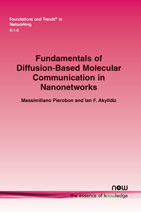Fundamentals of Diffusion-Based Molecular Communication in Nanonetworks
By Massimiliano Pierobon, University of Nebraska-Lincoln, USA, pierobon@cse.unl.edu | Ian F. Akyildiz, Georgia Institute of Technology, USA, ian@ece.gatech.edu
Abstract
Molecular communication (MC) is a promising bio-inspired paradigm for the interconnection of autonomous nanotechnology-enabled devices, or nanomachines, into nanonetworks. MC realizes the exchange of information through the transmission, propagation, and reception of molecules, and it is proposed as a feasible solution for nanonetworks. This idea is motivated by the observation of nature, where MC is successfully adopted by cells for intracellular and intercellular communication. MC-based nanonetworks have the potential to be the enabling technology for a wide range of applications, mostly in the biomedical, but also in the industrial and surveillance fields. The focus of this article is on the most fundamental type of MC, i.e., diffusion-based MC, where the propagation of information-bearing molecules between a transmitter and a receiver is realized through free diffusion in a fluid. The objectives of the research presented in this article are to analyze an MC link from the point of view of communication engineering and information theory, and to provide solutions to the modeling and design of MC-based nanonetworks. First, a deterministic model is realized to study each component, as well as the overall diffusion-based- MC link, in terms of gain and delay. Second, the noise sources affecting a diffusion-based-MC link are identified and statistically modeled. Third, upper/lower bounds to the capacity are derived to evaluate the information-theoretic performance of diffusion-based MC. Fourth, an analysis of the interference produced by multiple diffusion-based MC links in a nanonetwork is provided. This research provides fundamental results that establish a basis for the modeling, design, and realization of future MC-based nanonetworks, as novel technologies and tools are being developed.
Fundamentals of Diffusion-Based Molecular Communication in Nanonetworks
Molecular communication (MC) is a bio-inspired paradigm where the exchange of information is realized through the transmission, propagation, and reception of molecules. This paradigm was first studied in biology, since it is successfully adopted in nature by cells for intracellular and intercellular communication. MC is considered a promising option for communications in nanonetworks, which are defined as the interconnections of intelligent autonomous nanometer-scale devices, or nanomachines. Thanks to the feasibility of MC in biological environments, MC-based nanonetworks have the potential to be the enabling technology for a wide range of applications, mostly in the biomedical, but also in the industrial and surveillance fields.
Fundamentals of Diffusion-Based Molecular Communication in Nanonetworks analyzes the MC paradigm from the point of view of communication engineering and information theory, and provides solutions to the modeling and design of MC-based nanonetworks.
